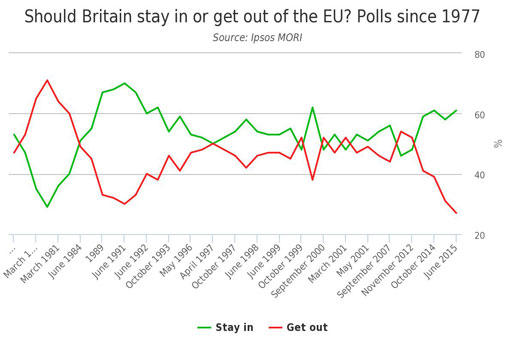Blog
Brexit: Is the UK Leaving EU Behind?

In July, US President Barack Obama urged the United Kingdom to remain a member of the European Union.
In an interview with the BBC's North America editor Jon Sopel, the American President said, "Having the UK in the European Union gives us much greater confidence about the strength of the transatlantic union," adding that his government wants “to make sure that the United Kingdom continues to have that influence."
Following the Conservative win during the May elections, Prime Minister David Cameron has often expressed his desire to hold a referendum on whether or not the UK should leave the EU. The plan is to stage the vote at some point before the end of 2017 with some claiming it will happen as soon as 2016.
Part of this push by Prime Minister Cameron is to pressure the EU into renegotiating the terms of the UK’s membership. According to a Bloomberg September 5, 2015 article, the UK Prime Minister’s requests “include new powers to withhold welfare payments from migrants, exemptions from some EU laws and the ability to opt out of further political integration known as an “ever-closer union.”
Recent Polls Show Mixed Results on Brexit
Polls set up by Ipsos Mori, a leading UK market research firm, show that during the past three years, the percentage of people polled wanting the UK to stay in the EU is trending upwards, reaching more than 60 percent in June 2015. What’s remarkable is that, according to this poll, support for a Brexit has hit all-time lows.

On the other hand, a similar September 2015 poll set up by ICM Limited suggests these numbers are a whole lot closer: 43 percent of the participants voted in favor of staying in the EU with 40 percent opting for a Brexit and 17 percent still uncertain about their decision.
Taxlinked.net member Belinda Wong, Director at Leader Corporate Services Limited in Hong Kong, says that, at the end of the day, this question is one of a political nature. “It is difficult to estimate how [this issue] will eventually play out. Politicians calculate the impact of each and every economic, social and political event on their own careers. It wouldn't be a surprise if some people from the UK advocate leaving EU just to gain general popularity.”
Here's a very brief summary of the main advantages and disadvantages of the UK leaving the EU.
Advantages of UK Leaving EU
 Stop Bankrolling the Weak: By leaving the EU, the UK would stop contributing funds (in the form of subsidies, bailouts and the such) to support weaker EU members and favored sectors. Treasury suggests that cutting down these expenses will save the country nearly £8 billion per year.
Stop Bankrolling the Weak: By leaving the EU, the UK would stop contributing funds (in the form of subsidies, bailouts and the such) to support weaker EU members and favored sectors. Treasury suggests that cutting down these expenses will save the country nearly £8 billion per year.
 Freedom from Unwanted Regulations: Rules such as the working-time directive, which caps the working day at 48 hours, and the agency-working directive, which grants temps the same rights as permanent staff members, would no longer need to be followed, opening up plenty of opportunities for UK businesses.
Freedom from Unwanted Regulations: Rules such as the working-time directive, which caps the working day at 48 hours, and the agency-working directive, which grants temps the same rights as permanent staff members, would no longer need to be followed, opening up plenty of opportunities for UK businesses.
 Re-Emergence as an Offshore Centre: Stringent EU regulations on offshore centers could be avoided, allowing the UK to improve its position as a financial services hub for the setting up of offshore companies and funds. A 2012 The Economist article says that, by the UK leaving EU, the country could become “a Singapore on steroids.”
Re-Emergence as an Offshore Centre: Stringent EU regulations on offshore centers could be avoided, allowing the UK to improve its position as a financial services hub for the setting up of offshore companies and funds. A 2012 The Economist article says that, by the UK leaving EU, the country could become “a Singapore on steroids.”
 Reclaim Its Borders: Via a Brexit, the UK will be able to regain control of their borders and pay closer scrutiny to the entry and exit of foreigners. Brussels will no longer set or influence the country’s immigration policy.
Reclaim Its Borders: Via a Brexit, the UK will be able to regain control of their borders and pay closer scrutiny to the entry and exit of foreigners. Brussels will no longer set or influence the country’s immigration policy.
Disadvantages of UK Leaving EU
 No More Free Trade?: The main advantage of being part of the EU is the existence of free trade within its borders. This, of course, makes it much simpler and affordable for the UK to exchange products and services with other member nations.
No More Free Trade?: The main advantage of being part of the EU is the existence of free trade within its borders. This, of course, makes it much simpler and affordable for the UK to exchange products and services with other member nations.
Taxlinked.net member Satwaki Chanda of Taxnotes.co.uk says, “Every country—wherever it is in the world—happens to do most of its trade with its neighbors. The US does a lot of its trade with Canada and Mexico, China's main trading partners are Japan and Korea, and the UK does most of it with Europe. So on the face of it, it makes sense to ‘stay in Europe.’”
Felix Bagilishya, Business Development & Marketing Director at Cobus Group in the UK, reminds us that “Britons contribute a lot of money to the EU,” about “£39.7 million every day, when rebates and other receipts are taken into account according to The Office for Budget Responsibility.”
He adds, though, that the “UK's contribution to the EU budget is a drop in the ocean compared with the benefits to business of being in the single market. The EU is the UK's main trading partner, worth more than £400bn a year, or 52% of the total trade in goods and services.”
Pundits suggest that, at least in the short-term, there will be a net loss to UK GDP with a Brexit. However, analysts do say that if the UK manages to sign a free trade agreement with the EU upon exit, the losses would be a lot less damaging.
 Reduced Job Market: Being part of the EU provides the UK with a much larger pool of potential employees, as well as more job opportunities for its citizens. By exiting, this market would significantly shrink, making it potentially harder to hire foreign professionals. Likewise, the freedom of movement in and out of the UK from within the EU would be jeopardized, as greater migratory controls would have to be put in place.
Reduced Job Market: Being part of the EU provides the UK with a much larger pool of potential employees, as well as more job opportunities for its citizens. By exiting, this market would significantly shrink, making it potentially harder to hire foreign professionals. Likewise, the freedom of movement in and out of the UK from within the EU would be jeopardized, as greater migratory controls would have to be put in place.
 Regulatory Framework: EU regulations, to a certain degree, are quite beneficial to the UK. Farmers and other sectors receive quantifiable subsidies from the EU, while jobs may be lost if certain industries opt to move their businesses to countries within the EU with cheaper labor, real estate and other such facilities. At the same time, by the UK leaving EU, the country would lose the ability to help set or influence policy for the continent and push its national agenda.
Regulatory Framework: EU regulations, to a certain degree, are quite beneficial to the UK. Farmers and other sectors receive quantifiable subsidies from the EU, while jobs may be lost if certain industries opt to move their businesses to countries within the EU with cheaper labor, real estate and other such facilities. At the same time, by the UK leaving EU, the country would lose the ability to help set or influence policy for the continent and push its national agenda.
 Loss of Influence: An isolated UK would lose influence with the United States and Europe and see its protagonism in world affairs somewhat decline. At the same time, NATO and its tenuous connection with the US would be weakened without the UK’s membership in the EU.
Loss of Influence: An isolated UK would lose influence with the United States and Europe and see its protagonism in world affairs somewhat decline. At the same time, NATO and its tenuous connection with the US would be weakened without the UK’s membership in the EU.